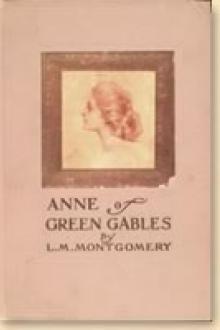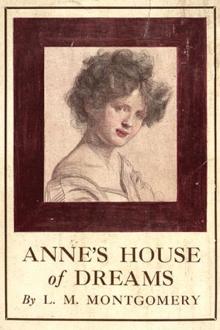Anne of the Island, Lucy Maud Montgomery [short story to read TXT] 📗

- Author: Lucy Maud Montgomery
- Performer: 0553213172
Book online «Anne of the Island, Lucy Maud Montgomery [short story to read TXT] 📗». Author Lucy Maud Montgomery
“How did William Obadiah take it?” queried Anne.
“Oh, he rumpussed a bit. But he’s going to see a skinny old maid in Millersville now, and I guess she’ll take him fast enough. She’ll make him a better wife than his first did. W.O. never wanted to marry her. He just asked her to marry him ‘cause his father wanted him to, never dreaming but that she’d say `no.’ But mind you, she said ‘yes.’ There was a predicament for you. Jog along, black mare. She was a great housekeeper, but most awful mean. She wore the same bonnet for eighteen years. Then she got a new one and W.O. met her on the road and didn’t know her. Jog along, black mare. I feel that I’d a narrer escape. I might have married him and been most awful miserable, like my poor cousin, Jane Ann. Jane Ann married a rich man she didn’t care anything about, and she hasn’t the life of a dog. She come to see me last week and says, says she, `Sarah Skinner, I envy you. I’d rather live in a little hut on the side of the road with a man I was fond of than in my big house with the one I’ve got.’ Jane Ann’s man ain’t such a bad sort, nuther, though he’s so contrary that he wears his fur coat when the thermometer’s at ninety. The only way to git him to do anything is to coax him to do the opposite. But there ain’t any love to smooth things down and it’s a poor way of living. Jog along, black mare. There’s Janet’s place in the hollow — `Wayside,’ she calls it. Quite pictureaskew, ain’t it? I guess you’ll be glad to git out of this, with all them mail bags jamming round you.”
“Yes, but I have enjoyed my drive with you very much,” said Anne sincerely.
“Git away now!” said Mrs. Skinner, highly flattered. “Wait till I tell Thomas that. He always feels dretful tickled when I git a compliment. Jog along, black mare. Well, here we are. I hope you’ll git on well in the school, miss. There’s a short cut to it through the ma’sh back of Janet’s. If you take that way be awful keerful. If you once got stuck in that black mud you’d be sucked right down and never seen or heard tell of again till the day of judgment, like Adam Palmer’s cow. Jog along, black mare.”
“Anne Shirley to Philippa Gordon, greeting.
“Well-beloved, it’s high time I was writing you. Here am I, installed once more as a country `schoolma’am’ at Valley Road, boarding at `Wayside,’ the home of Miss Janet Sweet. Janet is a dear soul and very nicelooking; tall, but not over-tall; stoutish, yet with a certain restraint of outline suggestive of a thrifty soul who is not going to be overlavish even in the matter of avoirdupois. She has a knot of soft, crimpy, brown hair with a thread of gray in it, a sunny face with rosy cheeks, and big, kind eyes as blue as forget-me-nots. Moreover, she is one of those delightful, old-fashioned cooks who don’t care a bit if they ruin your digestion as long as they can give you feasts of fat things.
“I like her; and she likes me — principally, it seems, because she had a sister named Anne who died young.
“`I’m real glad to see you,’ she said briskly, when I landed in her yard. `My, you don’t look a mite like I expected. I was sure you’d be dark — my sister Anne was dark. And here you’re redheaded!’
“For a few minutes I thought I wasn’t going to like Janet as much as I had expected at first sight. Then I reminded myself that I really must be more sensible than to be prejudiced against any one simply because she called my hair red. Probably the word `auburn’ was not in Janet’s vocabulary at all.
“`Wayside’ is a dear sort of little spot. The house is small and white, set down in a delightful little hollow that drops away from the road. Between road and house is an orchard and flower-garden all mixed up together. The front door walk is bordered with quahog clam-shells — `cow-hawks,’ Janet calls them; there is Virginia Creeper over the porch and moss on the roof. My room is a neat little spot `off the parlor’ — just big enough for the bed and me. Over the head of my bed there is a picture of Robby Burns standing at Highland Mary’s grave, shadowed by an enormous weeping willow tree. Robby’s face is so lugubrious that it is no wonder I have bad dreams. Why, the first night I was here I dreamed I COULDN’T LAUGH.
“The parlor is tiny and neat. Its one window is so shaded by a huge willow that the room has a grotto-like effect of emerald gloom. There are wonderful tidies on the chairs, and gay mats on the floor, and books and cards carefully arranged on a round table, and vases of dried grass on the mantelpiece. Between the vases is a cheerful decoration of preserved coffin plates — five in all, pertaining respectively to Janet’s father and mother, a brother, her sister Anne, and a hired man who died here once! If I go suddenly insane some of these days `know all men by these presents’ that those coffin-plates have caused it.
“But it’s all delightful and I said so. Janet loved me for it, just as she detested poor Esther because Esther had said so much shade was unhygienic and had objected to sleeping on a feather bed. Now, I glory in feather-beds, and the more unhygienic and feathery they are the more I glory. Janet says it is such a comfort to see me eat; she had been so afraid I would be like Miss Haythorne, who wouldn’t eat anything but fruit and hot water for breakfast and tried to make Janet give up frying things. Esther is really a dear girl, but she is rather given to fads. The trouble is that she hasn’t enough imagination and HAS a tendency to indigestion.
“Janet told me I could have the use of the parlor when any young men called! I don’t think there are many to call. I haven’t seen a young man in Valley Road yet, except the next-door hired boy — Sam Toliver, a very tall, lank, tow-haired youth. He came over one evening recently and sat for an hour on the garden fence, near the front porch where Janet and I were doing fancy-work. The only remarks he volunteered in all that time were, `Hev a peppermint, miss! Dew now-fine thing for carARRH, peppermints,’ and, `Powerful lot o’ jump-grasses round here ternight. Yep.’
“But there is a love affair going on here. It seems to be my fortune to be mixed up, more or less actively, with elderly love affairs. Mr. and Mrs. Irving always say that I brought about their marriage. Mrs. Stephen Clark of Carmody persists in being most grateful to me for a suggestion which somebody else would probably have made if I hadn’t. I do really think, though, that Ludovic Speed would never have got any further along than placid courtship if I had not helped him and Theodora Dix out.
“In the present affair I am only a passive spectator. I’ve tried once to help things along and made an awful mess of it. So I shall not meddle again. I’ll tell you all about it when we meet.”
On the first Thursday night of Anne’s sojourn in Valley Road Janet asked her to go to prayer-meeting. Janet blossomed out like a rose to attend that prayer-meeting. She wore a pale-blue, pansy-sprinkled muslin dress with more ruffles than one would ever have supposed economical Janet could be guilty of, and a white leghorn hat with pink roses and three ostrich feathers on it. Anne felt quite amazed. Later on, she found out Janet’s motive in so arraying herself — a motive as old as Eden.
Valley Road prayer-meetings seemed to be essentially feminine. There were thirty-two women present, two half-grown boys, and one solitary man, beside the minister. Anne found herself studying this man. He was not handsome or young or graceful; he had remarkably long legs — so long that he had to keep them coiled up under his chair to dispose of them — and he was stoopshouldered. His hands were big, his hair wanted barbering, and his moustache was unkempt. But Anne thought she liked his face; it was kind and honest and tender; there was something else in it, too — just what, Anne found it hard to define. She finally concluded that this man had suffered and been strong, and it had been made manifest in his face. There was a sort of patient, humorous endurance in his expression which indicated that he would go to the stake if need be, but would keep on looking pleasant until he really had to begin squirming.
When prayer-meeting was over this man came up to Janet and said,
“May I see you home, Janet?”
Janet took his arm — “as primly and shyly as if she were no more than sixteen, having her first escort home,” Anne told the girls at Patty’s Place later on.
“Miss Shirley, permit me to introduce Mr. Douglas,” she said stiffly.
Mr. Douglas nodded and said, “I was looking at you in prayer-meeting, miss, and thinking what a nice little girl you were.”
Such a speech from ninety-nine people out of a hundred would have annoyed Anne bitterly; but the way in which Mr. Douglas said it made her feel that she had received a very real and pleasing compliment. She smiled appreciatively at him and dropped obligingly behind on the moonlit road.
So Janet had a beau! Anne was delighted. Janet would make a paragon of a wife — cheery, economical, tolerant, and a very queen of cooks. It would be a flagrant waste on Nature’s part to keep her a permanent old maid.
“John Douglas asked me to take you up to see his mother,” said Janet the next day. “She’s bed-rid a lot of the time and never goes out of the house. But she’s powerful fond of company and always wants to see my boarders. Can you go up this evening?”
Anne assented; but later in the day Mr. Douglas called on his mother’s behalf to invite them up to tea on Saturday evening.
“Oh, why didn’t you put on your pretty pansy dress?” asked Anne, when they left home. It was a hot day, and poor Janet, between her excitement and her heavy black cashmere dress, looked as if she were being broiled alive.
“Old Mrs. Douglas would think it terrible frivolous and unsuitable, I’m afraid. John likes that dress, though,” she added wistfully.
The old Douglas homestead was half





Comments (0)